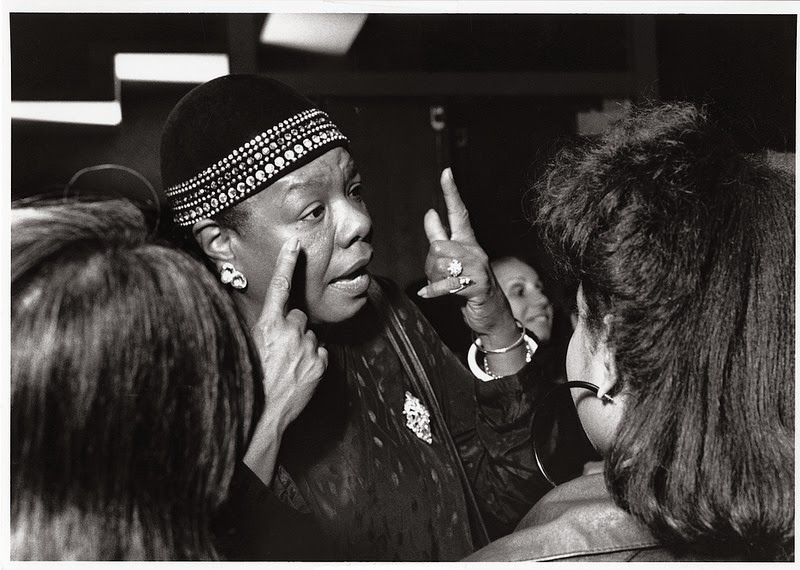Migration is Beautiful
"Meet powerhouse artist/activist Favianna Rodriguez — a leading voice in the movement of artists raising awareness about U.S. immigration issues."
- I am OTHER

Harvest of Empire
The Untold Story of Latinos in America “We are all Americans of the New World, and our most dangerous enemies are not each other, but the great wall of ignorance between us.”
Juan González, Harvest of Empire

Featured Post
Migration is Beautiful | Favianna Rodriguez | I am OTHER
"Meet powerhouse artist/activist Favianna Rodriguez — a leading voice in the movement of artists raising awareness about U.S. ...

Saturday, May 31, 2014
When great souls die: Maya Angelou endures through literary legacy, activism
Maya Angelou, an iconic voice of our generation famed for her bold autobiographical work as well as her poetry, passed on May 28, 2014. Important still were her significant contributions in speaking up for civil rights through her political activism as well as through her work that shed light on the pressing issues of her time.
In what is widely considered her greatest work I Know Why the Caged Bird Sings, Angelou discusses how she came to terms with her identity despite the racist and sexist oppression that permeated her early life through her teen years. Tragedy is evident from the get-go when she writes of how she was raped by her mother’s boyfriend when she was only eight years old. The rape becomes a metaphor for her suffering that is further compounded by her realizations that the society she lives in is dominated by white males who kept the Jim Crow laws in place. Still, she found ways to celebrate her roots and culture, inspired by her grandmother who was the only black store holder within her segregated community. It was here firsthand that The Culture Trip says “Angelou first witnessed the strength and spirit of the African-American community when it drew together.”
At 17 she gave birth to her only son as a single mother and split time between working as a prostitute in other odd jobs to make ends meet, eventually working as a nightclub dancer. It was novelist James O. Killens who convinced her to move to New York to focus on a writing career. Here she joined the Harlem Writers Guild, a part of the larger and highly influential Black Arts Movement. This movement was associated with the black power ideas of Malcolm X and embraced a radical, militant aesthetic than the mainstream, providing opportunities for greater African-American creativity and empowerment.
Angelou met and heard Martin Luther King, Jr. speak in 1960 and helped raise funds through organizing the revue Cabaret to Freedom for the Southern Christian Leadership Conference. That same year she was named northern coordinator for the SCLC.
She later became involved in anti-apartheid activism in Africa, spending most of her time in Ghana as a journalist where she met Malcolm X and worked to help him with the Organization of African-American Unity.
When Martin Luther King, Jr. and Malcolm X were assassinated in the late 1960s, Angelou was devastated and fell into a deep depression, finding reconciliation in creative pursuits. She wrote, produced, and provided the voiceovers for her ten-part documentary called Blacks, Blues, Black! about the relationship between blues music and black heritage for what would later become PBS. It was also in this period that she published her acclaimed autobiography I Know Why the Caged Bird Sings which brought her international fame. In her later years she continued to be politically active.
Angelou was asked to read her poetry at Bill Clinton’s inauguration where she chose to read “On the Pulse of the Morning”. The spoken word recording won her a Grammy and she noted,
“It is fitting that he asks a woman and a black woman to write a poem about the tenor of the times. It might be symbolic that black women when looked at are on the bottom of the graph. It is probably fitting that a black woman try to speak to the alienation, the abandonment and to the hope of healing those inflictions which have befallen all Americans, that accounts for white Americans feeling so estranged. Somehow a black woman knows all about that.”


Her recognition of how her ability to understand the struggles of both women and people of color enables her to have an overall broader worldview was core to her work and activism as a social humanitarian. As the Washington Post noted, “Her poetry and writing proved an honest and forceful examination of race and gender in the United States, which led to their popularity and hers in the political sphere.”
Perhaps the best example of this is her powerful poem “Still I Rise” which discusses the general societal hatred against black women. It’s a potent reminder of the reverberating voice the world has lost and the talent it has the opportunity to celebrate for generations to come. An excerpt:
You may cut me with your eyes,
You may kill me with your hatefulness,
But still, like air, I'll rise.
[…]
Out of the huts of history's shame
I rise
Up from a past that's rooted in pain
I rise
I'm a black ocean, leaping and wide,
Welling and swelling I bear in the tide.
Leaving behind nights of terror and fear
I rise
Into a daybreak that's wondrously clear
I rise
Bringing the gifts that my ancestors gave,
I am the dream and the hope of the slave.
I rise
I rise
I rise.
photo credit: zsrlibrary via photopin cc photo credit: Rusty Darbonne via photopin cc photo credit: wheelockcollege via photopin cc
Subscribe to:
Post Comments (Atom)




No comments:
Post a Comment